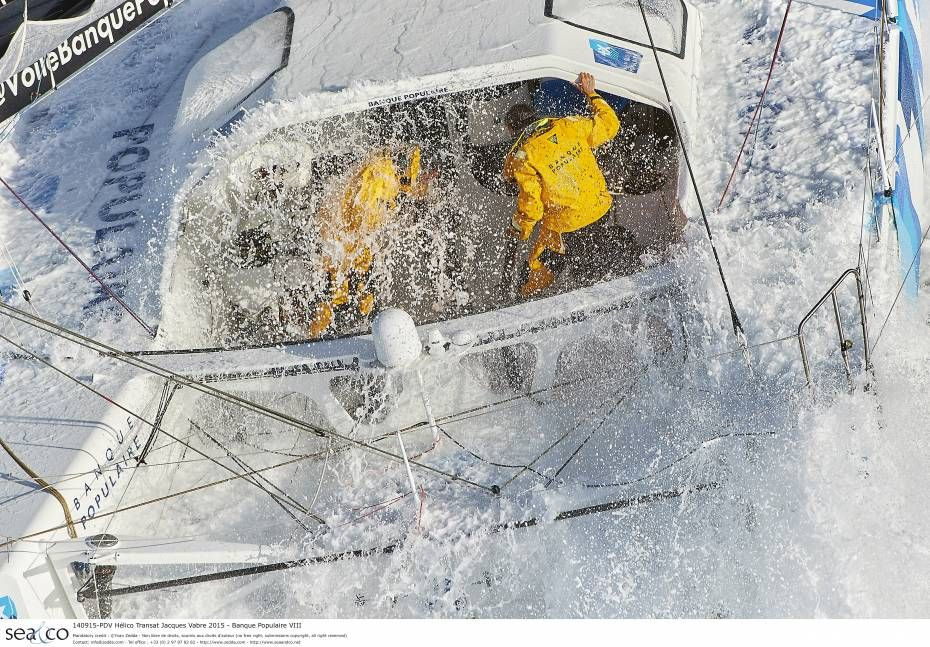The incredible physical exertion of IMOCA 60 skippers during a race

As much as a Tour de France cyclist! Who said sailing wasn’t physical? Not if you’re an IMOCA 60 skipper! These machines have become so fast and demanding that tough physical preparation is essential to cope with the demands on the body. And it’s not just the manoeuvres that are challenging...
Whether on solo races like the Vendée Globe or double-handed like the Transat Jacques Vabre, the first questions skippers are usually asked concern fatigue, lack of sleep and weight loss. These are logical questions, but as is the case for any man or woman, the effects on the skippers’ bodies and minds vary. Sébastien Josse explains he does not lose weight “but there is an obvious readjustment between fat loss and muscle gain”. Jérémie Beyou on the other hand claims: “I lose 3 to 4 kilos during a transatlantic race on an IMOCA. 60. I start shedding pounds right from the first days racing. The effort is really violent and you need a lot of muscle and a strong abdominal belt to face the heavyweight manoeuvres aboard an IMOCA 60.” When he talks about “the effort” he of course means the many efforts. The manoeuvres might be gruelling, but the taking and shaking of reefs, tacking and gybing are all incredibly physical. Not to mention stowing, which involves moving around great weights of several hundred kilos (about 500 – 600 every time) to balance the boat.
And then there’s the mental stress. Indeed, according to the ocean-skippers’ long-standing race doctor, Jean-Yves Chauve, mental stress can account for one third of the body’s fatigue and physical exertion. Moreover, the wide temperature swings due to latitude variations challenge the body’s natural defences, which struggle to adjust to the hot and cold weather. “And the simple fact of standing up without losing balance while continually re-adjusting posture to cope with a constantly moving boat requires a huge amount of energy,” continues Jean-Yves Chauve. To top it all, all this is endured by a metabolism weakened by sleep deprivation, since skippers stagger their sleep and rarely take more than 30 minute naps at a time.
Two Times More Calories Burned than for an Average Adult
It is easy to understand why so many skippers pay serious attention to physical training and nutrition before, during, and after a race. It’s hard to put numbers on it, but we’re beginning to be able to make some educated guesses on the subject. Generally speaking, an IMOCA skipper burns 5000 to 6000 calories a day. This is twice as much as a land-dweller with a normal physical activity. Dr Chauve’s second analogy may be even more telling: “This 6000 calorie expenditure is the same as that of the Tour de France cyclist! At first glance it does not look as if so many calories could be burnt on a yacht as the effort does not appear so spectacular. But on an IMOCA 60 it is definitely the case!”
Several Months to Recover
Result: At the finish line of a race the skippers’ bodies are suffering from exhaustion. We interviewed five skippers on the subject (Yvan Eliès, Jérémie Beyou, Armel Le Cleac’h, Sébastien Josse and Morgan Lagravière) and all agree that they need not just a few days or even a few weeks to fully recover from a big race on an IMOCA 60. It can take up to two or three months! “This is absolutely true,” agrees Dr Chauve. “Even high level athletes such as these accumulate fatigue from disturbed sleep patterns and an overall physical strain on the body. It takes time to get everything back into balance again, which is one of the reasons these skippers deserve so much respect.”
So what is the difference between a fast race like the Transat Jacques Vabre and a three-month round the world race like the Vendee Globe? The main distinction is in it being a single or double-handed race “because I have the feeling that the Vendée Globe race is fast becoming a sprint too, particularly for those battling for victory!” In a double-handed race, you can rely on each other but you push the boat harder. In a single-handed race, mental stress reaches its climax which generates a lot of fatigue – “about a third of the total energy expenditure” repeats Jean-Yves Chauve… “Sailing is a physical sport but it is also demanding intellectually. And that’s why it is so fascinating!” Demanding and fascinating indeed. Not to mention to the ever-present danger of an accident. “It’s logical: the faster the boats, the more violent will be the effect on the body of a sudden deceleration or impact. If you’re on a pushbike and you collide with a wall at 30km/h, you will get seriously hurt. This is why the Man/machine margin mustn’t be overlooked: the boats are becoming ever faster and more powerful, but the human body will always have its limits. The IMOCA 60 skippers obviously try to minimize risks as much as possible by being extremely well-trained. But the risk exists.
So, what about you? Still wanting to be in the line-up at the start of the next Vendée Globe?
Teams info
After a stunning 2025 season Sam Goodchild is the IMOCA Globe Series Champion for the second time
After a long season at the top of the IMOCA fleet that featured three race wins, Great Britain’s Sam Goodchild is for the second time in three years the IMOCA Globe Series Champion.
•••Quel rôle peut jouer la course au large dans la transformation du transport international ? Avec Pie…
Pour ce 10ᵉ épisode de Transitions, enregistré au Havre lors du départ de la Transat Café L'Or, nous recevons Jeremy Pochman, PDG de 11th Hour Racing, et Pierre-Antoine Morvan, responsable du pôle course au large et supe…
•••